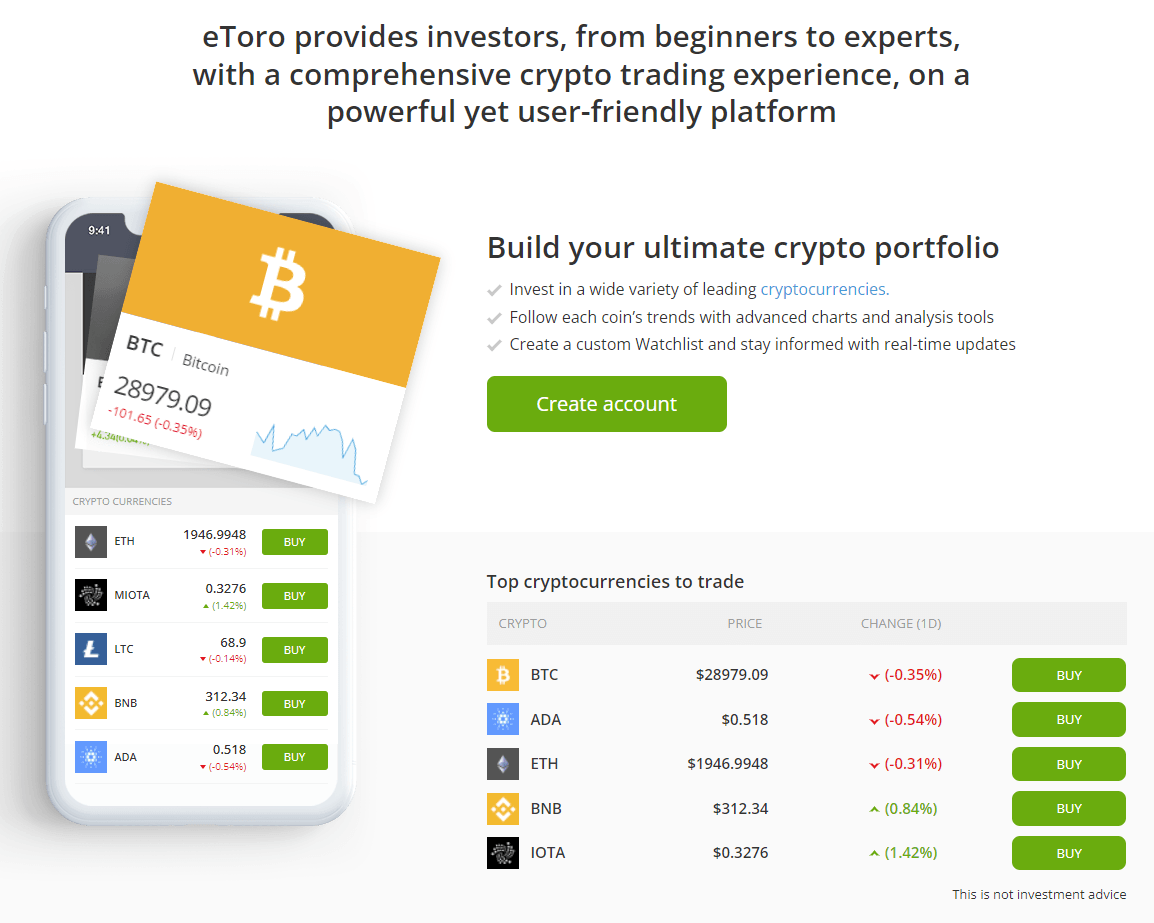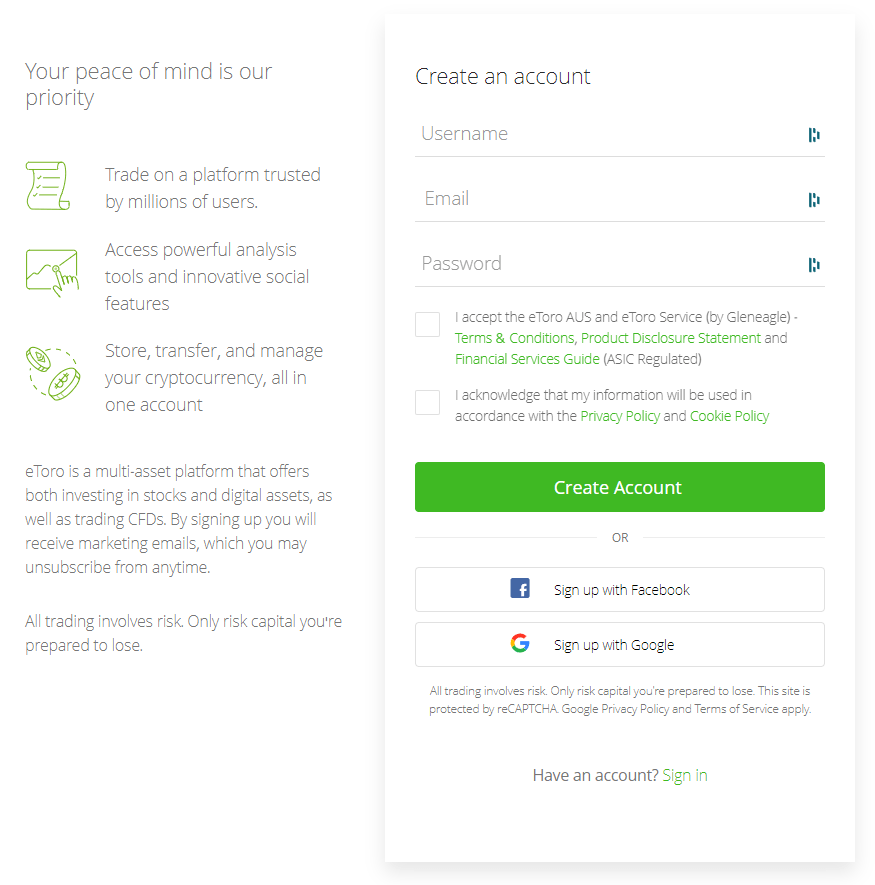How to Buy Crypto with Macquarie Bank
Summary: While Macquarie Bank doesn’t offer crypto trading on its own platform, you can easily use your account to buy crypto using a third-party crypto exchange.
There are plenty of Australian crypto exchanges to choose from, we recommend using eToro as the exchange to work with.
They have most of the popular cryptocurrencies available, are easy to work with, and have fantastic support!
Buy Crypto with eToro
[Rated 4.2/5 based on 15710 reviews on Trustpilot]
As mentioned above, just like most Australian banks, Macquarie Bank doesn’t offer cryptocurrency trading directly, as setting up a cryptocurrency trading platform is quite complex and comes with regulations and extra requirements for the banks.
There are many cryptocurrency exchanges that you can use for buying bitcoin and other cryptocurrencies.
Once signed up to an exchange (we’ll be using eToro for our example as it’s a widely trusted and global exchange), you can simply transfer funds from your bank account to the exchange, and trade it for crypto.
Table of Contents
How to buy crypto or bitcoin with Macquarie Bank
There are only 4 steps involved, let’s get started!
1. Choose a crypto exchange
As mentioned above, we’ll be using eToro for this guide as they are a widely used exchange and have over 50 cryptocurrencies to choose from. They also have a few really neat features like “Copy Trading”, which enables users to copy the trades of popular investors on the platform.
You can, of course, use any trusted crypto exchange for this, the steps will be very similar for most exchanges.
Let’s get started!
2. Sign up with the trading platform
The first thing to do is to sign up with the platform.
Once you’ve completed the initial sign up process, you’ll have to go through a quick verification process (also known as KYC).
3. Funding your account
Next up is funding your account. When it comes to depositing money to your eToro account, you have the option to use a bank transfer, PayPal, credit/debit card, and more.
4. Buy crypto
Finally, just go to the eToro Markets section, find the cryptocurrency you would like, and buy it.
And that’s it, it’s all pretty straightforward, now you know how to buy bitcoin or most other cryptocurrencies with Macquarie Bank.
About Macquarie Bank
Macquarie Group Limited, a global financial services company, is Macquarie Group Limited. Macquarie Group Limited is a global financial services group. It is headquartered in Australia and is listed there. Macquarie has more than 17,000 employees in 33 countries. They are the largest infrastructure asset manager in the world and Australia's top-ranked mergers and acquisitions advisor, with assets of more than A$737 million. The operating groups of the company are Banking and Financial Services and Commodities and Global Markets. Macquarie Asset Management and Macquarie Capital are Macquarie Capital.
Macquarie was established on 10/12/1969 as Hill Samuel Australia Limited. This subsidiary of Hill Samuel & Co. Limited in the UK, Macquarie. Stan Owens, an Australian businessman, drafted a proposal to Hill Samuel & Co. for the establishment of an Australian subsidiary. Owens presented his report to London and was given the responsibility of its implementation. He was elected Executive Chairman of Hill Samuel Australia (HSA). The company was founded by Owens from Gold Fields House, Sydney's Circular Quarter. Stan Owens and Blair Hesketh were the company's three first employees. Geoff Hobson was also a founding member. Later, Chris Castleman (on loan to the British parent), and Bill Clarke joined. HSA was introduced to Mark Johnson and David Clarke in 1971. They became joint managing directors. HSA turned a profit after twelve months, despite being granted a four year allowance by its British parent.
HSA secured Australia's largest mandate in 1971. It was a US$60m financing for John Lysaght Australia, a corrugated iron manufacturer. HSA opened two offices in Australia: one in Melbourne in 1972 and one in Brisbane in 1975.
HSA was also involved in other business ventures during the decade. HSA pioneered the Australian foreign currency hedge market, started gold bullion trading and expanded its coverage to all listed commodities. It was also the first merchant bank to receive floor membership status at the Sydney Futures Exchange.
The 1980s saw significant financial market deregulation in Australia. This included the floating of the Australian Dollar and the lifting of restrictions on foreign banks. HSA proposed the establishment of Macquarie Bank Limited, a bank that was substantially Australian-owned and controlled to take advantage of deregulation. Paul Keating, the Federal Treasurer, gave HSA authority to transform into Macquarie Bank Limited (MBL). This was the second private trading bank in Australia to be established since modern times.
In the 1980s, the bank continued to expand its activities. It was Australia's most successful bullion trader. They also started stockbroking and corporate lending activities. In addition to funds management, they opened offices in London, Munich and Australia. It implemented the risk management system that is responsible for Macquarie's unbroken history of profitability. This framework made sure Macquarie wasn't exposed to the global share market crash of October 1987.
Macquarie also established its philanthropic arm the Macquarie Group Foundation. This foundation has contributed more than $A330m to community organizations around the globe. It also established the Macquarie Group Collection, one of Australia's most important corporate art collections.
Macquarie Bank Limited was listed on the Australian Securities Exchange (ASX-MQG) on 29 July 1996. Macquarie Bank Limited had entered the ASX All Ordinaries Index on 30 October 1996. Its market capitalisation was approximately A$1.3B. In 2018, Macquarie would reach more than A$35B.
Macquarie expanded its overseas operations in the 1990s by opening offices in New York and Hong Kong, Singapore, Beijing and Beijing. It also extended its Australian operations to Perth, the Gold Coast, and Singapore. Among the acquisitions made during this decade were Security Pacific Australia, Boston Australia Limited and Bankers Trust Australia's investment banking arm.
Macquarie's infrastructure investment business was established in 1994 with the placement and underwriting of equity publicly listed for the Hills Motorway. These activities have been a major part of Macquarie's growth to make it the world's largest infrastructure manager. Macquarie also established its residential mortgages and private banking businesses during the decade. It also created a number real estate and investment trusts.
Macquarie expanded its Asia operations in 2000s through the opening of new offices in Seoul, Tokyo, and the acquisition of ING Group’s Asian cash equities company in March 2004. The decade also saw the global expansion Macquarie's infrastructure business with infrastructure investment funds being established in Korea and other countries in Asia, Europe, Russia and India. Macquarie Infrastructure Corporation was incorporated as Macquarie Infrastructure Company Trust (NYSE:MIC) on 16 December 2004.
In the latter part of 2000s, Macquarie made several significant acquisitions in the US. These acquisitions included Cook Inlet Energy Supply, an American energy marketing and trading company, which established Macquarie's US physical natural gas trading business. Constellation Energy's Houston-based downstream gas trading operations also made it into the US. Macquarie Group was the second-largest physical gas trader in North America as of 2018.
Other acquisitions include the UK's gas supplier company Corona Energy, which was acquired in August 2006, and Tristone Global Capital Inc, an independent energy advisory firm. In 2009, Tristone Global Capital Inc became a specialist investment bank Fox-Pitt Kelton Cochran Caronia Walker. Blackmont Capital Inc, a Canadian wealth management firm, purchased the wholesale electricity trading business from the US firm Integrys Energy. Allegiance Investment Management, based in the US, managed fixed income funds. The equity derivatives business and structured products division of the structured products and structured product business of the German bank Sal. Oppenheim and Condor Ferries service between France, the Channel Islands and the UK.
Macquarie has more than 17,000 employees in 33 countries. Macquarie's business activities can be divided into four main operating groups.
Two types of annuity-style businesses exist:
Macquarie Asset Management is the world's largest infrastructure asset manager. It is also a top 50 global manager of asset management, managing assets worth more than $A735.5 million for investors in multiple asset classes.
Banking and Financial Services – This includes Macquarie's retail banking operations and offers personal, wealth management and business banking services to around 1.7 million clients.
Two markets are available to businesses:
Commodities and Global Markets: A global business that offers capital and financing, market access, risk management and logistic solutions to its diverse clientele.
Macquarie Capital – Provides advice to companies regarding growth opportunities, source investment funds, negotiates deals, lists companies on the stock market and invests alongside clients.
Macquarie also has support groups that include the Corporate Operations Group, Financial Management Group and Legal and Governance Group.
Shemara Wikramanayake is Macquarie's Chief Executive Officer and Managing Director. Shemara replaced Nicholas Moore in December 2018.
Macquarie posted a record net profit of A$3.015billion for the year ended 31 March 2021 and a final dividend per ordinary shares of A$4.70 per shared.
Macquarie has a variety of licenses that allow it to operate in the jurisdictions where it operates. It is also regulated globally by many regulators. Macquarie Bank Limited in Australia holds a banking license and is authorised deposit-taking institutions (ADI) under the supervision of the Australian Prudential Regulation Authority. AUSTRAC and the Australian Securities & Investments Commission are also important regulators in Australia. Globally, the key regulators are the UK FCA, PRA, FINRA and NFA; FERC and SEC, FERC and Federal Reserve Board; IIROC and MAS; Hong Kong SFC, HKMA, SEBI; Japan FSA, Korean FSS, and New Zealand FMA.
Related:
 Author: Marco Vela -
Author: Marco Vela - 

